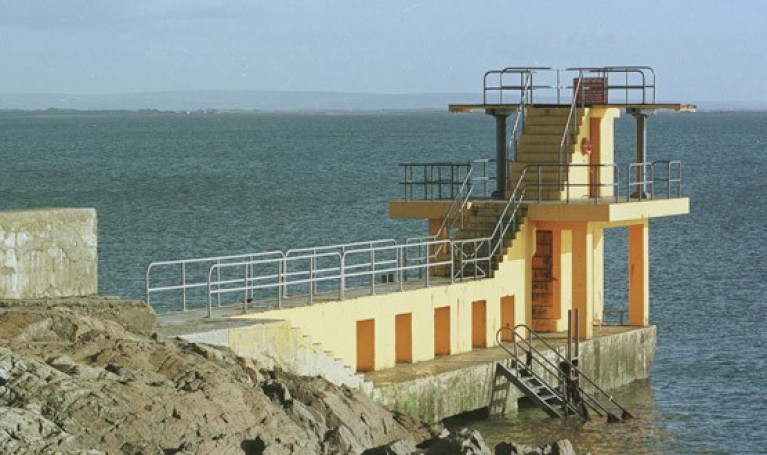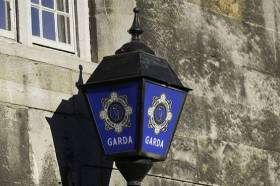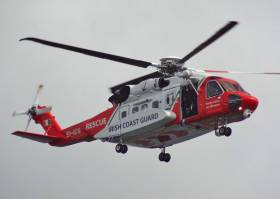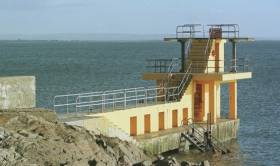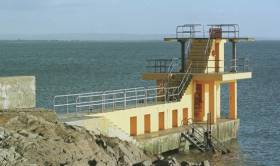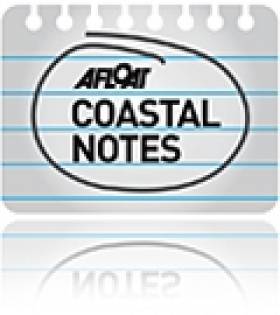Displaying items by tag: Salthill
Salthill’s Blackrock Diving Tower reopened yesterday (Wednesday 12 August) with Galway city officials keeping a watchful eye after it was closed following reports of overcrowding, according the Connacht Tribune reports.
Access to the tower was barred on Tuesday amid social distancing fears as crowds made the most of the sunny weather to take a dip in the warming waters of Galway Bay — which may have also helped keep alive two paddle boarders rescued earlier today after 15 hours at sea.
A spokesperson said the council will continue to monitor crowds at the tower to ensure social distancing in the queue to the platform is maintained.
The Connacht Tribune has more on the story HERE.
Gardai Investigate Drowning Incident Off Salthill
A man has died after getting into difficulty swimming in Galway Bay yesterday (Friday 23 August).
Independent.ie reports that the man aged in his late 70s had been swimming off Salthill around noon yesterday when he got into difficulty.
His body was recovered by a lifeguard and the scene was attended by emergency services but he was not revived.
Gardai say a file on the incident will be prepared for the Coroner’s Court.
Body Found In Search For Missing Swimmer Off Galway
#Galway - A body was found this morning (Friday 13 April) in the search for a swimmer missing off Salthill in Galway since yesterday.
The Irish Coast Guard’s Shannon-based helicopter Rescue 115 spotted the body on the seabed in shallow water offshore around 10.15am this morning as part of the ongoing search operation.
The body was recovered into Galway RNLI’s inshore lifeboat for transfer to Galway University Hospital. Pending formal identification, the search will be stood down.
Search units involved included An Garda Síochána and Civil Defence teams, and volunteer divers provide by the Irish Underwater Council.
Talks Over Return Of Blackrock Tower Liferaft
#Galway - Irish Water Safety in engaged in talks with Galway City Council over the possibility of reinstating the liferaft at BlackrockDiving Tower.
Councillors last year rejected proposals to replace the amenity after a poor health and safety assessment in 2015, as previously reported on Afloat.ie.
The raft was originally removed from the tower in Salthill in 2014 after it was associated with incidents of falls and near drownings.
But as Galway Bay FM reports, talks have begun in the wake of local public sentiment for the liferaft, with a view to including it in delayed upgrade works on the tower.
Liferaft Won't Be Part Of Blackrock Tower Upgrades
#Galway - The liferaft at Blackrock Diving Tower on Galway Bay is not likely to be reinstated, as Galway Bay FM reports.
Concerns over risks posed by the raft were reiterated at a meeting of Galway City Council earlier this week, following a poor health and safety assessment of the amenity last year.
The raft was removed from the tower in 2014 after it was associated with incidents of falls and near drownings recorded by lifeguards, according to the Connacht Tribune.
Afloat.ie reported late last month on a public consultation regarding long-awaited upgrades and repairs to the iconic diving tower in Salthill.
Public Hearing In Galway On Blackpool Diving Tower Upgrades
#Galway - Next Wednesday is the date for a public consultation on planned upgrades and repairs to the Blackpool Diving Tower in Salthill.
As the Galway Advertiser reports, the hearing will take place at the Salthill Hotel from 7pm to 10pm on Wednesday 30 March.
Viral Video Shows Dangerous Salthill Storm Swimming 'Stunt'
#StormDesmond - It was a 'red' alert for western coastal counties this weekend as Storm Desmond blew in from the Atlantic with extreme gusts and downpours.
But amid the damage and disruption across the country, Galway-based photographer Cathal Devlin took to social media to share his dismay at the recklessness of two would-be divers who decided the stormy conditions presented the perfect time to take a dip.
Devlin's video of the "stunt" at Blackrock Diving Tower in Salthill – which clearly shows the young men ignoring basic water safety advice by diving into rough seas, with blasts of spray occasionally obscuring the pier – has gone viral in the 24 hours since he first uploaded it to Facebook. But he says he did not post it for entertainment purposes.
"I do not know if they are strong swimmers or not, that is not the case," Devlin writes. "If any one of them got into difficulties there was no one there to do anything for them.
"The voluntary and rescue services are kept busy enough without having to worry about this type of stupid behaviour."
Picturesque Homes In Clare & Fermanagh Perfect For Anglers
#WaterfrontProperty - Two new properties on the market in Clare and Fermanagh are sure to appeal to keen anglers.
Sugarloaf on Clifden Hill in Co Clare overlooks Lake Inchiquin, described by the Irish Independent as an 'angler's paradise', and hosting a bounty of wildlife including the spectacular sea eagle.
But the picturesque spot is also a popular area for sunny-day picnics, and not only with the locals.
Sugarloaf provides a permanent picnic spot in the heart of that beautiful visa, with a detached three-bed home in 1.5 acres of gardens with panoramic views of the lake nearby and the Burren beyond.
And in spite of its privacy, with no neighbours in sight, you're just 3.5km from the village of Corofin and a swift drive further on to Ennis.
The Irish Independent has more on this property, on the market for €315,000.
North of the border, angling enthusiasts might be tempted by Amled's Fishing Lodge in Garrison, Co Fermanagh.
Within walking distance of Lough Melvin, the spacious detached five-bed home is on a secure site with high fencing, and plenty of room for boats and more in the driveway.
The wooded grounds have also been developed by the previous owner for wheelchair use, making garden maintenance easier than usual.
It's an unfinished renovation project - the upstairs is yet to be completed - but it'll be more than worth the effort to many, especially with an asking price of just £115,000 (€159,000). 4NI has more on this property.
Elsewhere, for those who just want to enjoy that seaside vibe, the Irish Independent sings the praises of Salthill in Galway.
Just a short walk from the centre of the City of the Tribes, the charming suburb maintains its own old-school seaside town atmosphere, with plenty of local social options, especially for dining.
And of course there's the renowned promenade, which hosts among others the annual An Tóstal race for Galway Hookers.
Dead Jellyfish On Galway Beach Still Pack A Sting, Experts Warn
#Jellyfish - Summer may be long gone, but jellyfish attracted by the warmer waters of recent months are still posing a hazard on Galway's beaches, as the Connacht Tribune reports.
Recent weeks have seen Salthill strewn with the remains of hundreds of dead mauve stingers, which can still pack a punch even after death.
Meanwhile, though marine science boffins are not surprised by the sheer numbers of the seaborne creatures in Galway Bay as this period is their mating season, they are concerned that so many are being washed ashore.
The jellyfish warning comes not long after Fáilte Ireland's falling afoul of locals for advising against bathing at Salthill's popular strand.
While recommending the city suburb's famous promenade for walking and sightseeing, the tourism board's Discover Ireland website reportedly stated that "swimming is not recommended" at the adjacent beachs.
No reasons were given for this advice, which has raised the ire of locals including Labour Party city councillor Niall McNelis, who said: “I cannot understand why Fáilte Ireland would warn people not to swim in Salthill. It has a Blue Flag."
Salthill Apartment With Commanding Views Of Galway Bay
#WaterfrontProperty - A first-floor apartment with a large balcony facing onto Galway Bay could be yours for €235,000.
The Galway Advertiser reports on No 13 Croit na Mara, a 75sqm abode overlooking the famous promenade in Salthill, within walking distance of Galway city centre.
The apartment boats two double bedrooms with one en-suite, plus a main bathroom, an open-plan kitchen/dining/living area and a utility room, with gas central heating and a B3 rating for energy performance.
Viewing is by appointment with Sherry FitzGerald, and more details are available HERE.



























